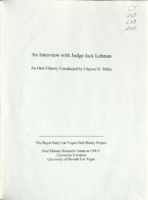Search the Special Collections and Archives Portal
Search Results

Transcript of interview with Elmore Curtis by Judy Curtis, March 1, 1975
Date
Archival Collection
Description
On March 1, 1975, collector Judy L. Curtis interviewed fire department captain, Elmore B. Curtis (born December 17th, 1896 in Minnesota) in his home in Las Vegas, Nevada. This interview covers life in Southern Nevada since 1942, including Mr. Curtis’s personal history and the early development of the Nevada Test Site. During the interview Mr. Curtis also discusses early tourism and socio-economic progress in Southern Nevada.
Text

Transcript of interview with Betty Ham Dokter by Roger Jablonski, February 27, 1977
Date
Archival Collection
Description
On February 27, 1977, Roger Jablonski interviewed Betty Ham Dokter (born 1922 in Las Vegas, Nevada) about her life in Southern Nevada. Dokter first talks about her upbringing and education in Las Vegas before describing church activity and the first casino properties that were built. She later talks about presidential visits, economic changes in Nevada, the construction of Hoover Dam, and some of the social changes in Las Vegas. The latter part of the interview covers the topics of racial minorities, environmental changes, early grocery stores and movie theaters, and social clubs. The interview concludes with a brief discussion on Mt. Charleston.
Text

Transcript of interview with Alice Doolittle by Christopher Moran, March 21, 1977
Date
Archival Collection
Description
On March 21, 1977, Christopher Moran interviewed Alice Doolittle (born 1897 in Boston, Massachusetts) about her experiences while living in Nevada. Also present during the interview is Ruth Belding, Alice’s daughter. Doolittle first talks about her reasons for coming to Las Vegas and her eventual occupation as a dental assistant. She also talks about her family’s history of living on the Stewart Ranch and the ranch’s swimming pool that attracted many during the summers of Las Vegas. Doolittle also describes her move to Boulder City with her husband, the first theaters in Las Vegas, and the Union Pacific Railroad. At the end of the interview, the three discuss Helen Stewart, Harley Harmon, and the Doolittle Center, named after Doolittle’s late husband, Ferris Doolittle.
Text

Transcript of interview with Roger Hurley Dudley by Beth McLaren, March 7, 1981
Date
Archival Collection
Description
On March 7, 1981, Elisabeth McLaren interviewed blackjack dealer, Roger H. Dudley (born August 10th, 1940 in Las Vegas, Nevada) in his home. This interview covers Roger’s recollections on growing up in Las Vegas. During the interview they further discuss Roger’s childhood, his parents, grade school, World War II, the atomic testing, the Mesquite Club, the development of the Strip, rodeos, Howard Hughes, Paradise Valley and changes in Las Vegas, Nevada.
Text

Transcript of interview with Wayne Earl by Diane Donovan, March 14, 1981
Date
Archival Collection
Description
On March, 14, 1981, collector Diane Donavan interviewed her neighbor, pharmacist Wayne Earl (born June 21, 1926 in St. George, Utah) at the collector’s home in Las Vegas, Nevada. This interview covers Earl’s early recollections of Nevada and his life after moving to Las Vegas in 1940. Earl also talks about World War II, McCarran Airport, Nellis Air Force Base, North Las Vegas politics, Jaycees, and the Chamber of Commerce. Additionally, Earl recalls his involvement in civic affairs, social and religious activities, including his affiliation with the Mormon Church.
Text

Transcript of interview with Sam Earl by Laura Button, March 9, 1981
Date
Archival Collection
Description
On March 9, 1981, Laura Button interviewed Sam Earl (born 1912 in Virgin, Utah) about his life in Nevada. Also present during the interview is Sam’s wife, Melissa Earl. The three discuss a wide range of topics from the early development of Las Vegas, Sam’s work on the Boulder Dam, the Earls’ early residence in a tent, and the family’s religious participation. The interview also covers gambling, Block 16, the first members of the police force, recreational activities, and the Helldorado parade. Sam also talks about his work as a building contractor, including some of the buildings and casino properties he helped build, and the interview moves to a discussion of the development of the Las Vegas Strip. The interview concludes with Sam’s description of his work as a truck driver and a discussion on welfare benefits.
Text

Irene Cepeda interview, April 24, 2019: transcript
Date
Description
Interviewed by Monserrath Hernández, Nathalie Martinez and Rodrigo Vázquez. Irene Cepeda is a woman dedicated to serving the Latinx as well as all minority groups in education in Southern Nevada. As a Las Vegas native, she grew up alongside the Latinx community here and is a proud Latina from Nicaraguan roots. She is dedicated to uplifting the Latinx community through her work with the Latino Youth Leadership Conference and college access specialist at Nevada State College. Now, as representative of District D on the Clark County School District Board of Trustees, she seeks to tackle the issues the district faces from acts of White supremacy to a lack of funding for English Language Learner families.
Text

Transcript of interview with Jack Lehman by by Claytee White, October 17, 2007
Date
Archival Collection
Description
Judge Jack Lehman is living the life we should all strive for - a wonderful family, a work ethic that has allowed him to serve others while enjoying a magnificent life and above all a great love affair with his beautiful artistic wife, Lou Lou. From Chemnitz, Germany, at the beginning of the Nazi reign to a prominent citizen of Las Vegas, Lehman lives an extraordinary Las Vegas life. Born in Germany in the late 1920s, Jack and his sister were sent to the United States in 1935 and after a series of living situations including a orphanage in New York, they were adopted by the Lehman family in Lake Arrowhead, California. As a young boy, he wanted to become a lawyer. After a degree from Berkeley, two tours of military duty, a stint in radio broadcasting, and serving as the Director of the Nevada Department of Economic Development, he entered law school at USC. Lehman's career in the legal field began at the largest law firm in the city - Lionel Sawyer and Collins - and then into private practice and on to the bench as a District Court judge appointed by Governor Richard Bryan. In February 2008, he was honored by judges and friends statewide as the founder of Nevada's Adult Criminal Drug Court Program commonly known as "drug court." Washoe County District Judge Peter Breen said it best, "The state is a much better place because of Jack. All those people came back from the abyss of addiction because of Jack."
Text

Transcript of interview with Pat Merl by Claytee White, October 9 & 28, 2008
Date
Archival Collection
Description
Patricia 'Pat' Merl plans for college did not materialized after graduation from a New Jersey high school in the late 1960s. Instead she took a receptionist job. The by the age of 19, it was her interest in dance classes that would lead her to audition to be a professional dancer for the Rockettes of Radio City Music Hall fame. Her days and weeks were filled with rigorous rehearsals and performances, but it was also an exciting time for a young and spirited girl. A side trip to Las Vegas in 1971 during her first ever vacation opened her to a new world of possibilities for a professional dancer. So without a job, she decides to remain in Las Vegas and explore the options. It became the beginning of a wide and varied career in the live entertainment industry. Pat's dancing resume includes working in many of the Las Vegas chorus lines of the 1970s, provides a flavor of what the work was like then and how it changed during the era. She includes the story of Frank Rosenthal and
Text

Transcript of interview with Daisy Lee Miller by Claytee White, March 22, 2013
Date
Archival Collection
Description
Daisy Lee Miller talks about being born and raised as an only child in Louisiana before moving to Las Vegas in her 20s. For a time, Daisy worked in the powder room at the California Club. It was while she was employed here that she realized she wanted something better, and she wanted to be a good example tor her kids. Daisy began attending the University of Nevada, Las Vegas to get her degree. Daisy is very proud of the fact that she graduated from UNLV at the same time that her daughter graduated from high school. Family has always been very important to Daisy, and she enjoyed spending time with her children while they were growing up. Sundays always found Daisy and her children at church while other leisure-time activities included trips to the lake or Mt. Charleston. While going to school, Daisy worked at the Economic Opportunity Board in the family planning program. Following graduation, Daisy began working for the Clark County School District where she rapidly advanced
Text
